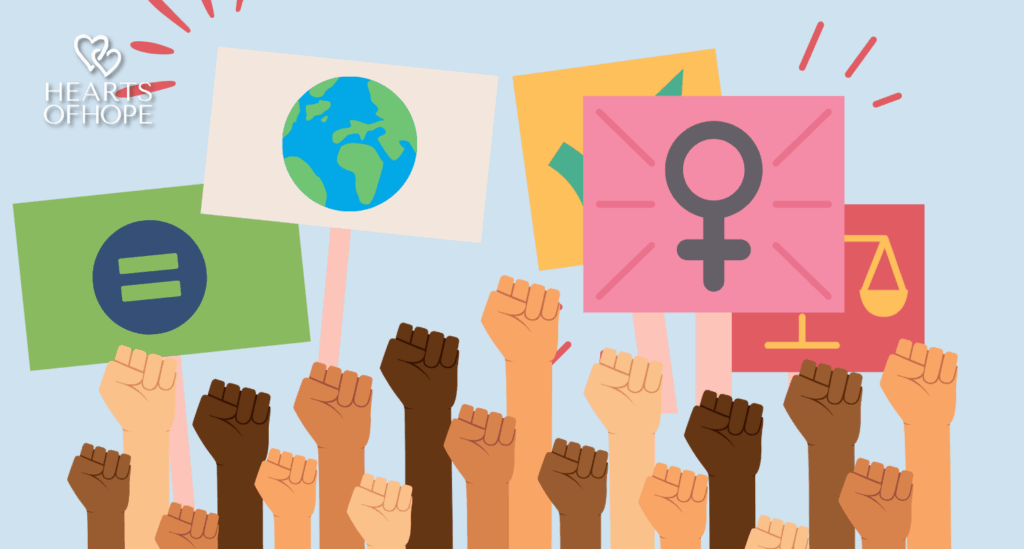How to Help Kids Cope With Uncertain Times

Four ways to support young people struggling with anxiety about their futures

Life today is overwhelming, complicated, and changing too quickly to keep up with. The future of work is changing as questions about remote jobs, labor movements, and the use of advanced AI create a new economic landscape. Our planet is getting hotter, and natural disasters are more frequent. We don’t have enough housing. It’s hard to imagine what the future will look like—for us and for our kids.
In our grief support community engagement projects, we hear from adults who are worried about the challenges their kids face, and we hear from kids who are anxious about their futures. The impact is staggering. Recent CDC data shows that over 40% of high school students showed signs of being depressed, and one in every three adolescents will experience an anxiety disorder.
We all want to help our children and students. But knowing what to do in the face of challenges that feel so big is daunting. In this post, we’ll share 4 ways that adults can help young people cope with anxiety about the future.
Focus on progress, not performance
Instead of signing your child up for every extracurricular activity or demanding top grades in each of their classes (plus prep for standardized tests), pay attention to their growth and curiosity. The world is changing too fast for us to have clear expectations about what efforts will lead to a successful life, and besides, life has always been unpredictable.
Succeeding every time shouldn’t be the goal, especially since it’s an impossible one. Encourage your kids to be confident in themselves and their ability to adapt. That might mean they bomb a piano recital, and instead of quitting, you support them in trying again the next year. They don’t need to be perfect, or even great. Show them the value of effort by praising the progress they do make.
Kids and teens who learn to value themselves for their capability to learn, rather than valuing themselves for what they can achieve, are better set up to adapt to a changing world. Instead of freezing when things inevitably don’t go their way, they’ll have the confidence to know that they can handle change.
Give them space to practice adaptability
It’s tempting to project our worries onto the young people around us. Sometimes that means we jump in with a rescue plan as soon as our child is uncomfortable. But giving young people space to solve their own problems is one of the best ways they can learn how to be adaptable to changing situations around them.
Let kids be bored without the instant gratification of screens in front of them. Show them that good things take time, and sometimes a little discomfort. Maybe that means cooking a meal as a family instead of ordering takeout, even if nobody is a great cook. Let them turn in an essay late instead of staying up all night with them to help them finish. Next time, they’ll think about how much more time they needed than they thought.
It’s also important not to assume our kids have the same fears they do. Their concerns might be different than what you’d expect. After all, they have grown up in a different reality than you have. Talk to them about not only what they’re feeling, but why they feel that way.
Normalize feelings like grief, fear, and anxiety
We never want the young people we love to feel bad. It’s second-nature to jump to trying to make your child feel better when they are struggling. But that misses an opportunity to teach them about the reality of emotions—they come, and they go. Help kids see that even their most intense feelings will change over time. You can do this by showing them your own emotions instead of stifling them, as well as practicing tools to help them ride the waves.
Model getting involved in issues that matter to you
It’s scary to feel like you have no control over the issues that are affecting your future. Getting involved in the things that concern us helps us feel more in control and active in our own lives, not to mention it helps us build community. If your students express fears over climate change, consider advising a club where they can come together to practice advocating for policies that support a greener future. If your children love to create but are worried about the impact of AI on publishing filmmaking industries, take them to a youth creative writing class at your local library.
The young people in your life might not be expressing such specific concerns. Often, anxiety about the future feels vast, and it’s hard for kids to identify exactly what it is that makes them feel out of control. If they see the adults in their lives dedicating time and energy to making change on the things that worry them, even if it’s in the smallest ways, they get to see a model of positive coping. Adults can show young people that they can channel feelings of hopelessness into action, and that action can turn into hope.
Despite the uncertainties that kids are facing today, they are also resilient. As caring adults, we can support them by not making assumptions about what success and coping look like. Instead, reflect on your own gut reactions to solve and soothe. When we encourage, model, and teach kids that they are capable and adaptable, even when they feel afraid, we help strengthen their resilience.
To learn more about our evidence-based tools and programs that increase resilience for young people in a changing world, check out our GRIT program for middle school students or reach out to info@ourheartsofhope.org.
Photo courtesy of Unsplash


